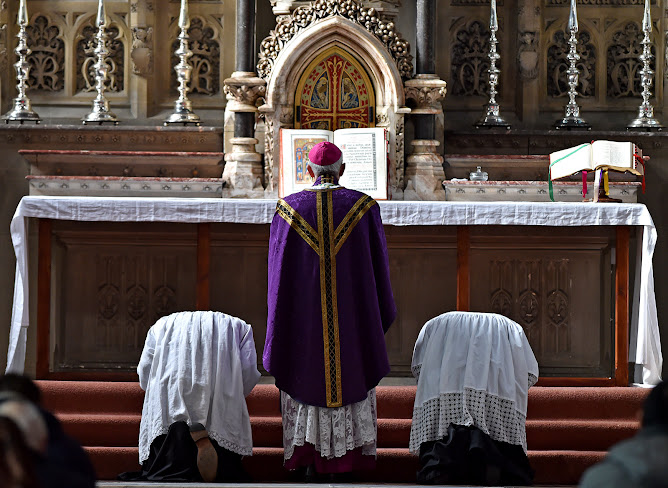Passiontide: The period in which the Church seeks to 'perfect' the Lenten conversion of heart.
 |
| Bishop Athanasius Schneider offering Passion Sunday Mass. Credit: FSSP UK |
As the Church moves into the final two weeks of Lent with the beginning of Passiontide, already signalling the fast approaching end of the penitential season of Lent, Dom Gueranger points ever more to the Passion of Christ as food for meditation in the upcoming days. Pointing back to the previous weeks of Lent, the holy abbott describes them as “but a preparation for the intense grief of the Church during these two.”
“We cannot, therefore, be surprised at her [the Church] inviting all her children to contemplate, during these weeks, Him who is the object of all her love and all her sadness,” adds Dom Gueranger, who notes how more the merely “compassion and tears” the Church calls Her children to “profit by the lessons we are to be taught by the Passion and Death of our Redeemer.”
Dom Gueranger writes, in the first part of his treatise on the mystery and practice of Passiontide and Holy Week:“During the four weeks that have preceded, the Church has been leading the sinner to his conversion; so far, however, this conversion has been but begun: now she would perfect it. It is no longer our Jesus fasting and praying in the desert, that she offers to our consideration; it is this same Jesus, as the great Victim immolated for the world’s salvation.
The fatal hour is at hand; the power of darkness is preparing to make use of the time that is still left; the greatest of crimes is about to be perpetrated. A few days hence the Son of God is to be in the hands of sinners, and they will put Him to death. The Church no longer needs to urge her children to repentance; they know too well, now, what sin must be, when it could require such expiation as this. She is all absorbed in the thought of the terrible event, which is to close the life of the God-Man on earth; and by expressing her thoughts through the holy liturgy, she teaches us what our own sentiments should be.
The pervading character of the prayers and rites of these two weeks, is a profound grief at seeing the just One persecuted by His enemies even to death, and an energetic indignation against the deicides. The formulas, expressive of these two feelings are, for the most part, taken from David and the Prophets. Here, it is our Saviour Himself, disclosing to us the anguish of His soul; there, it is the Church pronouncing the most terrible anathemas upon the executioners of Jesus. The chastisement that is to befall the Jewish nation is prophesied in all its frightful details; and on the last three days, we shall hear the prophet Jeremias uttering his lamentations over the faithless city. The Church does not aim at exciting idle sentiment; what she principally seeks, is to impress the hearts of her children with a salutary fear. If Jerusalem’s crime strike them with horror, and if they feel that they have partaken in her sin, their tears will flow in abundance.
Let us, therefore, do our utmost to receive these strong impressions, too little known, alas! by the superficial piety of these times. Let us reflect upon the love and affection of the Son of God, who has treated His creatures with such unlimited confidence, lived their own life, spent His three and thirty years amidst them, not only humbly and peaceably, but in going about doing good [Acts 1: 38].
And now this life of kindness, condescension, and humility, is to be cut short by the disgraceful death, which none but slaves endured: the death of the cross. Let us consider, on the one side, this sinful people, who, having no crimes to lay to Jesus’ charge, accuse Him of his benefits, and carry their detestable ingratitude to such a pitch as to shed the Blood of this innocent and divine Lamb; and then, let us turn to this Jesus, the Just by excellence, and see Him become a prey to every bitterest suffering: His Soul sorrowful even unto death [St. Matt. 26:38]; weighed down by the malediction of our sins; drinking even to the very dregs the chalice He so humbly asks His Father to take from Him.
Lastly, let us listen to His dying words: ‘My God, My God, why hast Thou forsaken Me?’ [Matt 27:46]. This it is that fills the Church with her immense grief; this it is that she proposes to our consideration; for she knows that, if we once rightly understood the sufferings of her Jesus, our attachments to sin must needs be broken, for, by sin, we make our selves guilty of the crime we detest in these Jews.


Customer support group by way of Live Chat or email and the pleasant staff at the top NetEnt casinos will provide help. To make it simpler for players to get started, we make sure that|be sure that|ensure that} the registration process is easy and quick. Alex is an experienced iGaming writing, having labored in the trade 우리카지노 since 2015. He covers all features of iGaming, with a specific interest in sports.
ReplyDelete